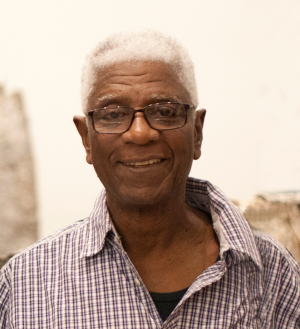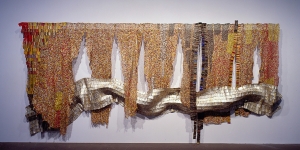
El Anatsui
Artist Bio
Born in Ghana and based in Nigeria, El Anatsui crafts bottle caps, reused aluminum commercial packaging, copper wire, and other materials into giant shimmering sheets of what he calls “cloths.” These metallic cloths are pliable and change according to how they are displayed in a gallery. In many ways, Anatsui’s work recalls traditional African kente cloth, which is made by weaving long strips into a patchwork whole. For the artist, as the son and brother of professional kente weavers, the kente cloth has both personal meaning and symbolic power.
Anatsui’s beautiful quilts of silver and dull gold transcend their materials to become a metaphor for shifting contexts and images of Africa. Embedded in the metal fragments are multiple histories and influences, ranging from the effects of the colonial period on Africa to current problems facing its people, including alcoholism, pervasive poverty, and the impact of global markets on the continent’s economies. Anatsui’s work also carries a poetic import. Critic Holland Cotter describes the pieces as reflections of “an African essence of three interchangeable parts always in motion: memory, reality, determination.”
Strips of Earth’s Skin, 2008, evokes layers of dense history through its materials. Anatsui often speaks about the use of liquor labels and caps in his work, namely how colonial powers used liquor as items of trade and barter with Africans, with culturally complex results. Strips of Earth’s Skin is mindful of such histories, finding them literally and metaphorically part of the fabric of Anatsui’s life and work.


